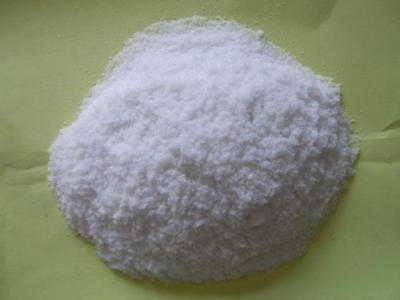Erlotinib hydrochloride
Product Name: Erlotinib hydrochloride
Synonyms: ERLOTINIB HCL;ERLOTINIB HCL SALT;ERLOTINIB HCL SALT :TARCEVA;Erlotinib, Hydrochloride Salt;N-(3-Ethynylphenyl)-6,7-bis(2-methoxyethoxy)-4-quinazolinamine, Hydrochloride Salt, OSI 774, Tarceva; N-(3-Ethynylphenyl)-6,7-bis-(2-methoxyethoxy)-quinazolin-4-amine;[6,7-Bis-(2-methoxy-ethoxy)-quinazolin-4yl]-(3-ethynyl-phenyl)-amine;Tarceva Hydrochloride See E625000
CAS: 183319-69-9
MF: C22H24ClN3O4
MW: 429.9
EINECS:
Product Categories: API;Molecular Targeted Antineoplastic;Heterocyclic Compounds;anti-neoplastic;Heterocycles;Intermediates & Fine Chemicals;Pharmaceuticals;Tarceva;Antineoplastic;Anti-cancer&immunity;Inhibitors
Mol File: 183319-69-9.mol
Erlotinib hydrochloride Structure
Antineoplastic drug Erlotinib hydrochloride is a kind of small molecule epidermal growth factor receptor tyrosine kinase reversible inhibitors. It is mainly used for the second-line or third-line treatment of the locally advanced or metastatic non-small cell lung cancer and for the treatment of pancreatic cancer.
Erlotinib Erlotinib hydrochloride is hydrochloride of molecular targeted drug erlotinib. The US Food and Drug Administration (FDA) has approved erlotinib (Tarceva) in combination with gemcitabine for the first-line treatment of locally advanced and metastatic pancreatic cancer.
Small molecule compound erlotinib is a kind of receptor tyrosine kinase inhibitors. It can inhibit the phosphorylation reaction through competitively combined with the catalytic site of receptor tyrosine kinase tyrosine with the ATP, thus blocking the under proliferative signal transduction, and inhibiting the activity of tumor cell ligand-dependent HER-1/EGFR in order to inhibit tumor cell proliferation. Erlotinib is another tyrosine kinase inhibitor for treatment of NSCLC. The results ofⅠclinical trials showed that its main toxicity and side effect were dose-dependent skin rashes and diarrhea, other rare side effects were headache, nausea, vomiting and the like.
Erlotinib is used as the second-line anticancer drugs in the Ⅱ clinical trial. Its effects are same as second-line chemotherapy drugs docetaxel. The Ⅲ clinical randomized controlled trials (BR21) [22] mainly aimed at NSCLC patients after the failure of first-line or second-line chemotherapy (locally advanced and having distant metastasis). The study group used erlotinib 150mg a day for a total of 488 cases. The control group used placebo for a total of 243 cases. The results were: the median overall survival: 6.7 months for the treatment group, 4.7 months for the control group (P<0.001, mortality ratio HR=0.73); survival rate for one year: 31.2% of the treatment group and 21.5% of control group; median progress time: 9.9 weeks for treatment group and 7.9 weeks for control group. Meanwhile the improvement of the patient's symptoms in the erlotinib group is more obvious.
A number of Ⅲ clinical researches were conducted based on the results of BR21. TRIBUTE clinical trials used erlotinib in combination with chemotherapy in an attempt to compare that whether the efficacy of it combined with chemotherapy alone was better than chemotherapy or not. The treatment group used chemotherapy (carboplatin plus paclitaxel) and erlotinib, while control group used the same chemotherapy alone. There are a total of 1059 cases of patients with advanced NSCLC joined the observation. Results showed that the effective rate of the study group is 21.5%, and the effective rate of the control group is 19.3%. Median survival: 10.8 months for the study group, and 10.6 months for the control group; time to tumor progression (TTP): 5.1 months for the study group, 5.0 months for the study group. Another TALENT study is that whether the combination of erlotinib with chemotherapy (gemcitabine+cisplatin) is able to improve the efficacy of chemotherapyor not for a total of 1172 cases of NSCLC patients. The results also did not show that erlotinib could significantly improve the efficacy of chemotherapy.
The above information is edited by the Chemicalbook of Ge Qian.
Uses 1. Erlotinib hydrochloride is a kind of small molecule epidermal growth factor receptor tyrosine kinase reversible inhibitor. It is mainly used for the second-line or third-line treatment of locally advanced or metastatic non-small cell lung cancer and for the treatment of pancreatic cancer.
2. HER-1/EGFR tyrosine kinase inhibitors.
Chemical Properties Off-White Solid
Usage Selective epidermal growth factor receptor (EGFR)-tyrosine kinase inhibitor. Antineoplastic
Usage Erlotinib HCl is an HER1/EGFR inhibitor with IC50 of 2 nM.






